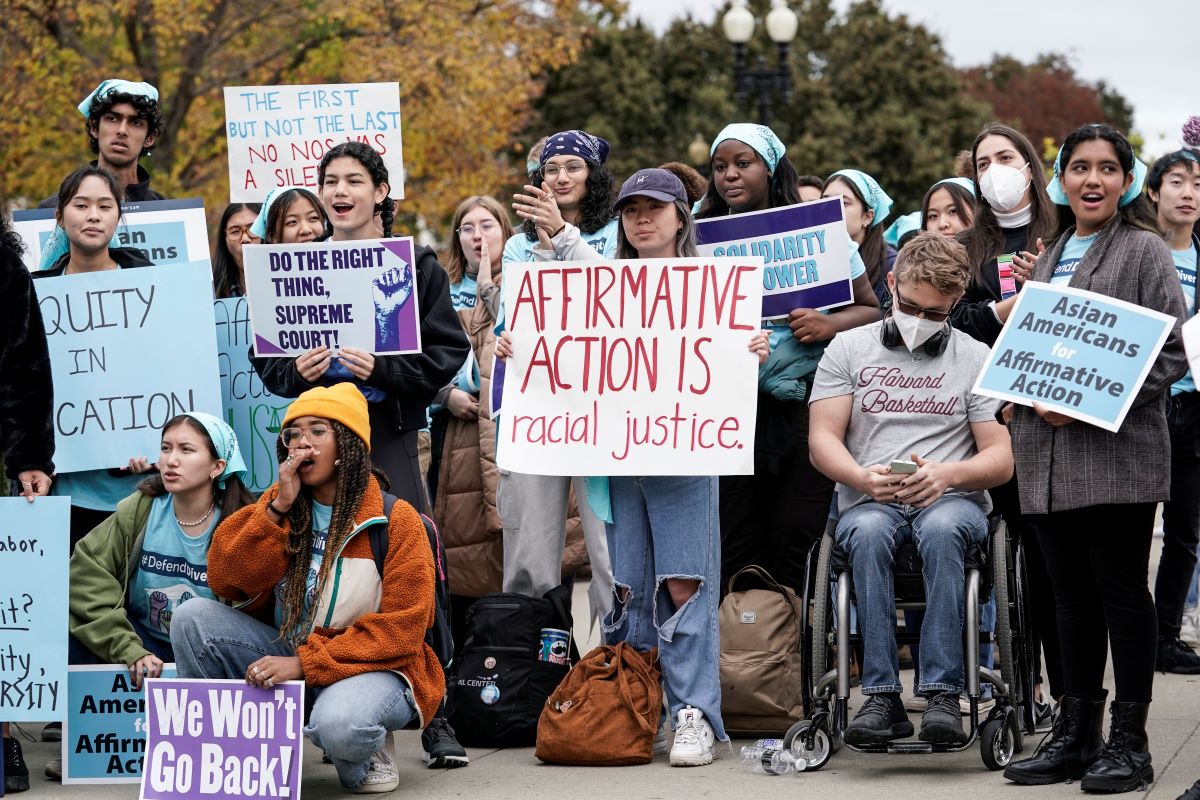In an expected decision, the Supreme Court June 29 struck down affirmative action for college admissions programs at Harvard and the University of North Carolina, saying the practice violated the Constitution’s 14th Amendment by discriminating against white and Asian American students.
But several Asian American organizations, as well as Black and Latino civil rights groups, condemned the decision, immediately mobilizing protests on the steps of the Supreme Court and holding press conferences throughout the day.
And the two Black justices on the Supreme Court, Clarence Thomas and Ketanji Brown Jackson, went head to head with opposing decisions. Jackson recused herself from the Harvard case citing a conflict of interest, but did weigh in on the UNC case.
Colorblind?
Thomas argued that the Constitution aims to be colorblind. “Even in the segregated South where I grew up, individuals were not the sum of their skin color. Then as now, not all disparities are based on race,” he said.
“It is no small irony that the judgment the majority hands down today will forestall the end of race-based disparities in this country, making the colorblind world the majority wistfully touts much more difficult to accomplish,” Jackson countered. “(This decision) will delay the day that every American has an equal opportunity to thrive, regardless of race,” she said, noting that it will only widen socio-economic gaps between white and Black people.
Chief Justice John Roberts, who wrote the majority opinion, left a bit of wiggle room. “Nothing in this opinion should be construed as prohibiting universities from considering an applicant’s discussion of how race affected his or her life, be it through discrimination, inspiration, or otherwise,” he wrote. Some legal analysts have interpreted Roberts’ statement as saying applicants could write in their college essays about how racial bias has impacted their lives, but conceded that this part of the ruling is murky, and will require interpretation.
Students for Fair Admissions
The case was brought about by Students for Fair Admissions, which cheered the Supreme Court decision. Edward Blum, founder and president of Students for Fair Admissions, said in a statement: “The opinion issued today by the United States Supreme Court marks the beginning of the restoration of the colorblind legal covenant that binds together our multi-racial, multi-ethnic nation.”
“The polarizing, stigmatizing and unfair jurisprudence that allowed colleges and universities to use a student’s race and ethnicity as a factor to admit or reject them has been overruled. Ending racial preferences in college admissions is an outcome that the vast majority of all races and ethnicities will celebrate,” said Blum.
Equal Opportunity
Asian Americans Advancing Justice — Advancing Justice — denounced the decision as an attack on civil rights. “We are outraged that the Supreme Court has chosen to ignore long-standing legal precedent in favor of supporting racial inequity that harms all people of color, including Asian Americans,” said John C. Yang, President and Executive Director of Advancing Justice – AAJC.
“But we are more committed than ever to ensuring equal opportunity for our children – and for all children in this country. We will not let this court decision keep us from pushing colleges and universities, Congress, and others to keep today’s ruling from undermining the progress made toward educating future multiracial, talented leaders who deserve every opportunity to reach their highest potential on campuses that reflect the diversity of America,” he said.
‘Extremist Minority’
The NAACP also condemned the ruling. “Today the Supreme Court has bowed to the personally held beliefs of an extremist minority. We will not allow hate-inspired people in power to turn back the clock and undermine our hard-won victories. The tricks of America’s dark past will not be tolerated,” said NAACP President and CEO Derrick Johnson.
“Affirmative action exists because we cannot rely on colleges, universities, and employers to enact admissions and hiring practices that embrace diversity, equity and inclusion. Race plays an undeniable role in shaping the identities of and quality of life for Black Americans. In a society still scarred by the wounds of racial disparities, the Supreme Court has displayed a willful ignorance of our reality,” said Johnson.
Barriers to Higher Education
Aarti Kohli, Executive Director of Advancing Justice – Asian Law Caucus, agreed that the Supreme Court had overlooked the long history and present-day reality of denying Black students equal access to education.
“Racism and anti-Blackness are inescapable in our country, and race-conscious admissions are a crucial tool in expanding opportunities for students of color that reckons with those realities,” said Kohli, noting that the decision will also particularly harm Pacific Islander, Native Hawaiian, and Southeast Asian communities who “continue to face significant barriers to higher education.”
“At a moment when our country is increasingly segregated and there are significant gaps in resources for majority minority schools, we call on Congress, our local elected leaders, and universities to do everything in their power to implement solutions we really need for economic equity and racial justice in our nation,” said Kohli.
MALDEF
The Mexican American Legal Defense and Educational Fund said it has long supported race-conscious policies, including affirmative action, “as necessary to address a legacy of racial discrimination and exclusion in higher education.”
“Unfortunately, as expected, a backward- thinking conservative Supreme Court majority today reversed nearly half a century of precedent because of their limited consideration of race,” said MALDEF President and General Counsel Thomas Saenz.
The civil rights leader called for communities and policy makers to “root out systemic and ongoing inequities in the K-12 pipeline, as well as deep research to identify and modify or eliminate all admissions criteria with a demonstrated and unjustified bias and discriminatory effect on students of color, including Latinos, the nation’s largest minority community in the student population.”




